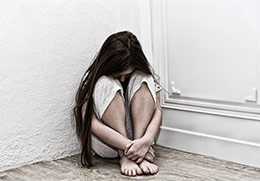06 June 2018
 In a paper published in The Lancet Public Health journal this month, a University of South Australia (UniSA) research team has estimated a concerning gap in the workforce required to deliver tertiary-level community health care to infants, children, adolescents and their families across South Australia.
In a paper published in The Lancet Public Health journal this month, a University of South Australia (UniSA) research team has estimated a concerning gap in the workforce required to deliver tertiary-level community health care to infants, children, adolescents and their families across South Australia.
The world-first, needs-based study, funded by the NHMRC and SA Health and led by UniSA expert in the social determinants of health, Professor Leonie Segal, identified seven per cent of children (to age 18) in South Australia are suffering very high to extreme levels of distress.
Professor Segal says the distress is typically due to adverse family environments and community stressors such as severe financial distress, parental separation, parental mental illness, bullying, family and community violence.
“That equates to more than 27,000 kids in SA suffering extreme or high levels of psychological distress and at considerable risk of long term mental health problems,” she says.
“The consequences of poor mental health for the individuals and society are dire – school failure, family separation, depression, self-harming, alcohol abuse, suicide, welfare dependency, child protection involvement, teen pregnancy, involvement in crime - a cycle of damage and powerlessness.
“As South Australia allocates similar resources as other states to this problem, the study points to a nationwide gap in treatment resources to meet the needs of infants, children and adolescents who are distressed and facing serious current and future adversity.
“In South Australia we would have to boost the clinical budget to $100 million, just to ensure the most vulnerable and distressed children were receiving the best level of care,” Prof Segal says, compared to a current spend of $24 million on community-based CAMHS teams.
“We would need to grow our trained workforce by almost 950 community and mental health professionals to support the high unmet need that is having such devastating consequences for children and the wider community.”
The research relied on data from the Longitudinal Study of Australian Children and the Young Minds Matter mental health surveys and focus groups of people working with troubled children - mental health workers, social workers, counsellors, teachers from the government, NGO sectors.
Prof Segal says the research underlines an urgent need for a new approach and stronger investment in the mental health of young people.
“We need to support the up-skilling and advanced training of mental health practitioners and of workers in the broader community services sector (such as Centrelink staff, housing, justice) so they can work more compassionately with the extremely troubled and traumatised infants, children and adolescents and their families who come to them for assistance,” she says.
“Poor mental health has its genesis in trauma, in the complex layering of adversity. What will be central to success, is understanding that mental health issues can’t be considered in isolation.
“We need a connected response that includes a vibrant central agency staffed by a highly skilled inter-disciplinary workforce of psychologists, social workers, OTs, psychiatrists, paediatricians, youth workers, speech pathologists, able to offer outreach therapeutic services into community agencies working with vulnerable families - into early childhood centres, schools, child protection, justice services, intensive family-support services.
“As a society and a community if we don’t spend the dollars to help infants, children adolescents and their families in distress, the same money and more will be spent on the devastating consequences, as early issues become more intractable.”
The analysis excluded private psychology and psychiatry as these services are not team-based and therefore suited to a less complex population. Family support programs working with vulnerable families were also excluded, as these agencies rarely offer a team-based therapeutic mental health service. Similary, Headspace was not included in the analysis.
South Australia’s Chief Psychiatrist, Dr John Brayley, says what the research has highlighted are significant gaps that need to be addressed for the benefit of children now and in the future.
He says child and adolescent mental health will be a specific area of focus in the State’s new Mental Health Services Plan, to be developed this year.
National Mental Health Commissioner Professor Helen Milroy says the research finally provides an evidence base for what we have known for a long time.
“There is a desperate need not only for prevention and early intervention in childhood but for a sophisticated, highly skilled and appropriately resourced mental health system for children and adolescents,” Prof Milroy says.
“We will never address the increasing burden of mental health problems into the future unless we pay attention to what is happening to our children.”
The SA Commissioner for Children and Young People, Helen Connolly, commends the research, and strongly supports the call for an innovative service response that practically addresses the mental health needs of infants, children and young people.
“With a family focus at the forefront of a more comprehensive set of mental health services, I believe we can make an important impact on the outcomes for individuals and the community,” she says.
Director of the Centre for Community Child Health at the Royal Children’s Hospital in Melbourne and Professor at the Murdoch Children’s Research Institute, Frank Oberklaid, says child mental health has long been marginalised in policy and funding discussions.
“Addressing child mental health issues is both worthy in its own right, as well as a preventive strategy that can reduce the incidence of mental health problems in later years, and the personal, social and economic burden associated with the long-term negative consequences of mental health problems,” Prof Oberklaid says.
Research lead: Professor Leonie Segal 08 8302 2473, Mobile 0418 300 805, Email Leoine.segal@unisa.edu.au
Media contact: Michèle Nardelli mobile 0418 823 673 email michele.nardelli@unisa.edu.au


